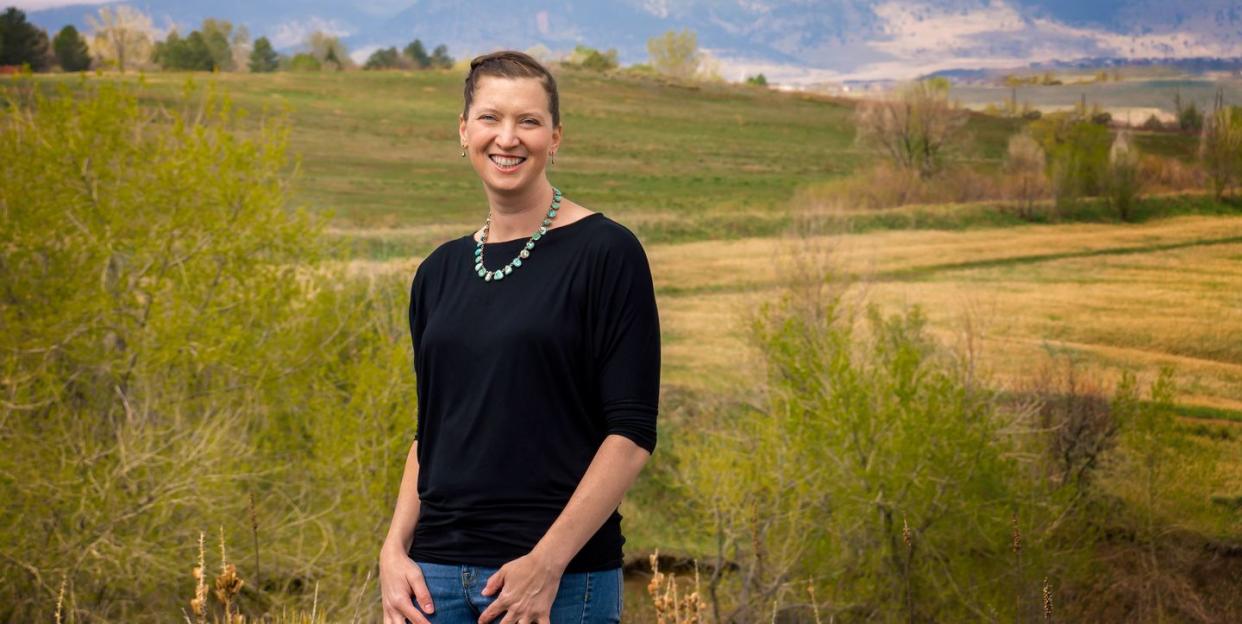12 Years of Chronic Joint Pain Has Taught Me Invaluable Life Lessons

When I was diagnosed 12 years ago, I didn’t know young people could get rheumatoid arthritis (RA). I was 25 years old and finishing up my first year of a dual degree program, getting my master’s in environmental studies and studying law. I had terrible pain and swelling in my fingers and wrists, but the timing lined up with my law school exams, so I figured, Oh, it’s just fatigue from too much typing.
I was busy, so I ignored the symptoms, expecting that I'd feel better when the semester ended, and I had more time to rest. But the pain only got worse. During a visit to my mom in California, my knees swelled up to the size of grapefruits, and I had trouble walking. There were no more easy ways to explain away the symptoms.
Adjusting to my new normal.
In the grand scheme of things, I was diagnosed quickly—just two or three months after my symptoms came on so suddenly and severely.
My now-husband Austin and I were dating then, so after I realized that having RA meant I’d have chronic pain and inflamed joints that could make ordinary activities challenging, I sat him down and said, “I have to live with this for the rest of my life, but you don’t. Are you sure you still want to be with me?” He didn't miss a beat. He’s been with me every step of the way, through finishing graduate school and starting a family. We have three kids now—ages 7, 5, and 2.
We went on a walk/bike ride as a family today - so nice just to get outside a little bit!!
A post shared by Mariah (@fromthispoint.forward) on Mar 21, 2020 at 5:03pm PDT
Those first six years after my diagnosis I had some level of joint pain all the time. It’s different now. I know where my limits are, and how to work around them.
RA has taught me invaluable lessons.
Because of my varying pain and energy levels, I’ve learned to ask for help when I need it—it’s just one of the countless ways I've grown by living with RA. Here are a few more that I think may just help anyone living with RA or chronic pain.
The right doctor will help you reach your goals.
You don’t have to give up on your goals and dreams because of RA. Whether it’s a job or traveling, you can find a way to do it with a rheumatologist by your side who listens to you and empowers you. You don’t want a doctor who says, “No, you shouldn’t do that,” or only worries about treating your joints and fatigue.
Obligatory belly pic - baby's first Folks Fest!
A post shared by Mariah (@fromthispoint.forward) on Aug 21, 2017 at 1:20pm PDT
For example, my rheumatologist found ways to ensure I could dance at my own wedding, which was really important to me. He adjusted my meds to make sure I felt as good as possible for that day. When I wanted to have my first baby, he helped me through that process, too.
Advocating for yourself can make all the difference.
After my diagnosis, I was constantly in pain and I had trouble sleeping due to anxiety about my health. Being so fatigued made it hard to keep up with my school work so I took a semester off, and came back when my symptoms were more under control.
I told my professors what was going on, and they were really understanding about me not always being caught up on my work. I also asked the university’s disability department to grant me accommodations since I couldn't physically type for three hours straight during exams. It took a bit longer than I originally expected, but ultimately I graduated from school with both degrees. The bottom line: Don’t be afraid to push for what’s important for you and ask for any accommodations you need to ensure you’re successful.
Paying it forward can be emotionally healing.
It took me a while to reach out and connect with other people who were living with RA. Social media wasn’t really a thing when I was diagnosed. I’m glad it’s around now. I run a support group on Facebook for moms with chronic conditions, and do a lot of patient advocacy work, which helps me make something positive out of something negative. I struggled on my path to becoming a mom, but if I can make that easier for other moms in the future, that helps me move forward emotionally.
For others with RA: Don’t hold off on building relationships with people who can really empathize with what you’re going through—it’s so valuable for coping with your own day-to-day stressors, and there’s no advantage to going it alone.
Vacation aftermath. The knees too. This is real life with #rheumatoidarthritis. #curearthritis
A post shared by Mariah (@fromthispoint.forward) on Jun 8, 2018 at 1:49pm PDT
There are always silver linings.
RA changed the direction of my life in a big way, and not all of it was bad. Some of it helped me prioritize and focus on the things that made me happiest. It’s also allowed me to teach my kids invaluable lessons about compassion, and not judging people by how they look, because they know I experience pain even though they can’t see it. Hopefully they’ll carry those lessons out to the world, too.
You may find that it’ll take you time and space to process your diagnosis, and that’s OK. Just know that having RA does not mean the end to your dreams and plans, and that you might find silver linings to this diagnosis as well.
You Might Also Like

